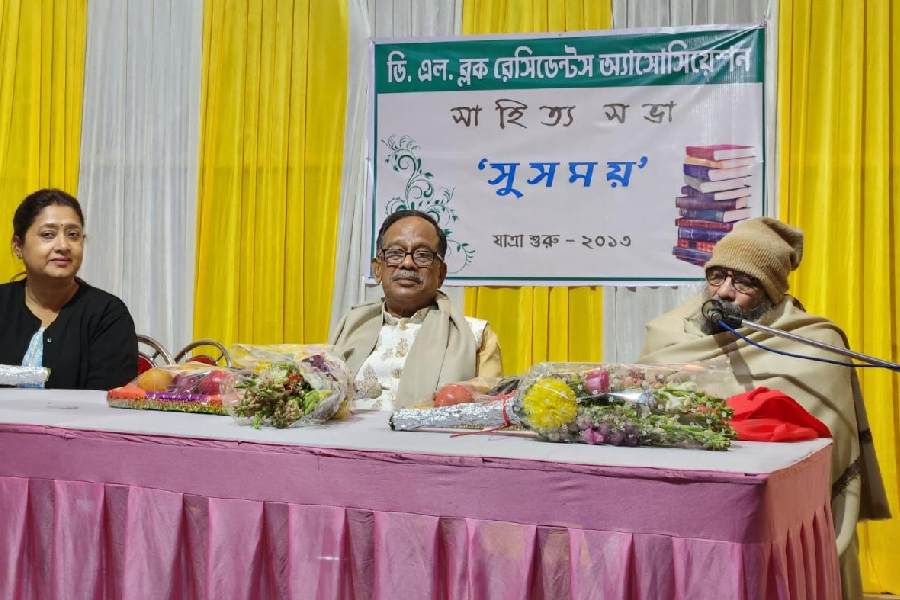Two dignitaries were hosted by DL Block last week who illuminated the audience by sharing anecdotes from their work.
The event was organised by Susamay, the literary wing of DL Block residents’ association, and the guests were poet Joy Goswami and Dr Ratan Chandra Kar, a resident of the block who was conferred the Padma Shri in 2023 for his service to the Jarawas of Andaman Islands.
Goswami was felicitated by elderly resident Ranjana Mitra, who recited Goswami’s poem Katha and gifted him her own books of poetry. “Thanks to Susomoy, even those who not into literature are getting drawn to it,” she said.
Goswami shied away from making a formal speech and invited the audience instead to a question-and-answer session (see page 5). But he paid tribute to his fellow invitee. “I got tuberculosis while still in school and have been sickly all throughout my life. I got covid twice. So to me, doctors are gods,” he said, turning the spotlight to Kar. “It is they who do meaningful work. Poets simply sit in a corner and write.”
The audience begged to differ. “Doctors treat our bodies but poets nourish our minds,” said Shelly Basu and Goswami conceded. “I agree. I too have drawn great strength from books,” he said.
Basu, and many other residents, recited Goswami’s poems and this turned out to be a treat in disguise for him. Bhaswati Mitra recited such rare poems, like Sesh Katha, that Goswami admitted he couldn’t even remember having written them!
“Yesterday I was invited to a grand ceremony and was felicitated alongside international achievers. But what I’m receiving from you today seems a much greater award,” smiled the resident of Srabani Abasan.
The event took place on January 12, Swami Vivekananda’s birth anniversary, and so the poet recited some poems from his book on Ramakrishna, Sarada Ma and Swamiji.
Sakila Khatun stirred up old memories when she said she knew Goswami as a youth in Ranaghat, where they both grew up. “My elder brother was your friend and your mother was the headmistress of my school,” she said.
This got the poet to recall simpler times. “I’m reminded of a maiden who lived in our neighbourhood, who was betrothed but the wedding did not materialise. “I had contemplated speaking to her several times but it was difficult as boys and girls wouldn’t mingle as freely as today. Then again, had I mustered the courage to speak to her, perhaps my emotions would not have poured into a poem,” he said, before reciting the resulting poem, Snan, from memory.
Sujit Dutta asked Goswami why at 70 he had decided not to publish his poems anymore. “I have received enough from poetry. I’ll continue writing but just won’t publish anymore,” he said. “Please pray that I can live the rest of my life with my rewaz.”
Tithi Ganguly, asked how to, in the digital age, attract youth to literature. “I am not on Facebook but I understand that good poetry is circulated there. If my daughter and her friends read something noteworthy there, they get me print-outs to read,” Goswami said. “Technology helps; just see how you all are reciting by reading off your phones instead of carrying books around. Rather than forcing the youth to toe our line, let them do what they like. They’ll find their path. Let us not assume technology is bad.”
Councilor Kakali Saha said the event was significant at a time when Bengali literature was losing its audience. “Such events should take place in every block,” she said.
Sanhita Sengupta, a member of Susomay, said they hold meets on the first Tuesday of every month and their 35-odd members discuss literature and culture. “Today was a special meet with Goswami, who is a popular poet, and Dr Kar, who we have long wanted to honour but who is usually very busy,” added another member Sujata Bhuti.
